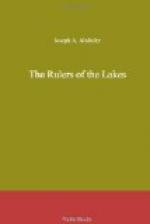“Now, Tayoga,” he said, “exert that famous will of yours like a true medicine man of the Hodenosaunee. While I am absent, so direct me with the concentrated power of your mind that I shall soon find a fat young deer, and that my arrow shall not miss. I’ll gratefully receive all the help you can give me in this way, though I won’t neglect, if I see the deer, to take the best aim I can with bow and arrow.”
“Do not scoff, O Dagaeoga. The lore and belief of my nation and of the whole Hodenosaunee are based upon the experience of many centuries. And do you not say in your religion that the prayer of the righteous availeth? Do you think your God, who is the same as my Manitou, intended that only the prayers of the white men should have weight, and that those of the red men should vanish into nothingness like a snowflake melting in the air? I may not be righteous,—who knows whether he is righteous or not?—but, at least, I shall pray in a righteous cause.”
“I don’t mock, Tayoga, and maybe the power of your wish, poured in a flood upon me, will help. Yes, I know it will, and I go now, sure that I will soon find what I seek.”
He left the cave and passed up the valley, full of confidence. The earnestness of Tayoga had made a great impression upon him, clothing him about with an atmosphere that was surcharged with belief, and, as he breathed in this air, it made his veins fairly sparkle, not alone with hope, but with certainty.
He walked up a deep defile which gradually grew shallower, and then ascended rapidly. Finally he came out on a crest, crowned with splendid trees, and he drew a great breath of pleasure as he looked upon a vast green wilderness, deepened in color by the long and recent rains, and upon the far western horizon a dim but splendid band of silver which he knew was Andiatarocte. A lover of beauty, and with the soul of a poet, he could have stood, gazing a long time, but there was a sterner task forward than the contemplation of nature in the wild.
He must sink the poet in the hunter, and he began to look for tracks of game, which he felt sure would be plentiful in the forest, since men had long been hunting one another instead of the deer. He had an abundance of will of his own, but he felt also, despite a certain incredulity of the reason, that the concentrated will of his distant comrade was driving him on.
He walked about a mile, remaining well under cover, having a double object, to keep himself hidden from foes and also to find traces of game. His confidence that he would find it, and very quickly, was not abated, and, at the end of a mile, he saw a broad footprint on the turf that made him utter a low exclamation of delight. It was larger than that of a cow, and more pointed. He knew at once that it had been made by a moose, the great animal which was then still to be found in the forests of Northern New York.




